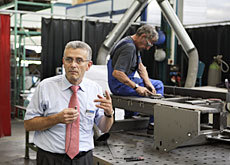
“Godfathers” help foreign workers integrate

A mentoring scheme known as the "Godfather system" is helping foreign employees integrate into the workforce of small and medium-sized enterprises (SMEs).
Swiss firms are increasingly having to look abroad for staff to expand their ranks, but SMEs have less experience in recruiting internationally. Godfathers are seen as one way around the problem.
A recent survey by Swiss banking giant UBS revealed that the country’s industrial sector is working at 91.4 per cent capacity and that 40 per cent of firms are looking to recruit new personnel.
With the economy booming, the supply of skilled Swiss workers can no longer meet demand, particularly in the engineering sector, which has led to more foreign recruits crossing into Switzerland.
“SMEs are looking more and more abroad for workers as there is a skills shortage at the moment. Smaller companies have been worse hit because it is hard to compete with big business on wages and conditions,” Professor Thierry Volery of St Gallen’s University’s SME Institute told swissinfo.
“One solution is to look abroad and there are now more foreign workers in smaller companies than before,” he added.
But unlike international firms such as Novartis, Nestlé or UBS, smaller companies have less time, resources and experience to cope with the demographic changes in their workforce.
Gaining full potential
The Godfather system, developed at the ZfU International Business School in Thalwil on the outskirts of Zurich, pairs up new foreign recruits with established Swiss workers to help smooth the integration process.
The Godfather mentor should be someone with an interest in the foreign colleague’s country of origin, ZfU chief executive Christophe Soutter told swissinfo. But the scheme has also been devised to be a two-way street between both parties.
“The Godfather can explain how Swiss people live and [describe] the cultural and political system to help the new recruit acclimatise,” he said. “But the Godfather should also translate the recruit’s culture and philosophy to other Swiss employees.”
“It is a concept to help companies integrate expats from different cultures and bring out their full potential.”
The privately operated business school trains managers already working in Swiss companies and Soutter hopes the Godfather system will permeate into such firms through the school’s “graduates”.
New mindset
Opinions are mixed as to how important such schemes are at present in Switzerland. Professor Volery pointed out that most SME foreign recruits come from neighbouring European Union countries to avoid potential cultural and immigration problems.
But Soutter counters that even the integration of employees from larger European neighbours needs careful consideration to avoid culture clashes. And both agree that globalisation is forcing firms of all sizes to change their way of thinking.
“Big global companies like Novartis and Nestlé change their language and their whole way of thinking to deal with the whole world,” Soutter said.
“SMEs now have problems because they have to act and think globally. Their mindset is slowly changing in this way.”
swissinfo, Matthew Allen in Zurich
Foreign workers in Switzerland at the end of June 2006 (latest Federal Statistics Office figures):
Total: 850,000 – an increase of 2.4% on 2005.
Swiss workers: 3.2 million
Italians: 19% (minus 5,000 from 2005)
Western Balkans: 18.7% (minus 2,000)
Germans: 12.1% (up 10,000 or 10.6% from 2005)
Portuguese: 12.1% (up 7,000 or 7.4%)
Spanish and Greeks: 6.2%
French: 5%
Austrians: 2.3%
Others: 24.2%
More than 60% of foreign workers come from the European Union and the European Free Trade Agreement zone.
A third of those who moved in the past decade have managerial jobs, or are employed in an intellectual or scientific capacity.
Around 94% of workers from northern and western Europe arrived with a higher education certificate of some kind between June 2005 and June 2006. This figure drops to 48% for immigrants from southern Europe and the west of the Balkans.
For the Portuguese, only 28% of those with a Swiss job have an education beyond compulsory schooling.

In compliance with the JTI standards
More: SWI swissinfo.ch certified by the Journalism Trust Initiative































You can find an overview of ongoing debates with our journalists here . Please join us!
If you want to start a conversation about a topic raised in this article or want to report factual errors, email us at english@swissinfo.ch.